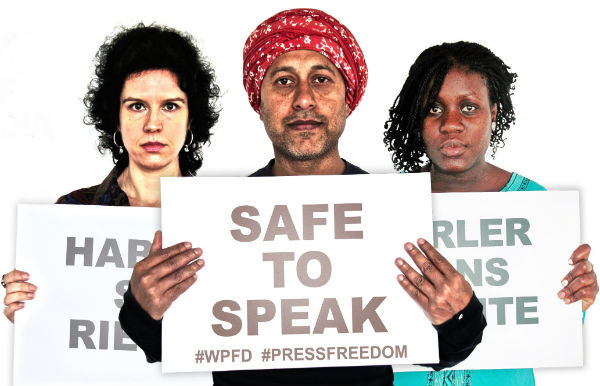May 3 is World Press Freedom Day.
This day was declared as such in 1993, by the United Nations General Assembly to raise awareness of the importance of freedom of the press and to remind governments of their duty to respect and uphold the right to freedom of expression, which is enshrined under Article 19 of the Universal Declaration of Human Rights.
World Press Freedom Day (or just World Press Day) is an opportunity to:
- celebrate the fundamental principles of press freedom
- assess the state of press freedom throughout the world
- defend the media from attacks on their independence
- pay tribute to journalists who have lost their lives in the line of duty
This year marks the 20th anniversary of World Press Freedom Day.
The 2013 theme of this day is “Safe to Speak: Securing Freedom of Expression in All Media,” with a particular focus on the issues of safety of journalists, combating impunity for crimes against freedom of expression, and securing a free and open Internet as the precondition for online safety.
In honor of World Press Freedom Day, students from ECV (École de Communication Visuelle, i.e. school of visual communication) Atlantique in Nantes, France, and in-house creatives from Fabrica, the Benetton research center on communication, produced these two videos.
Freedom of expression applies to all media, including blogs, and accounts on Facebook, Twitter, YouTube, and other social networking sites.
Search and use the hashtag #WFPD and #pressfreedom for posts and tweets related to World Press Freedom Day.
As is the case every year, various international agencies have included Armenia in their evaluation of press freedom around the world. The three main agencies assessing media freedom are Freedom House, IREX and Reporters Sans Frontières (Reporters Without Borders).
Freedom House Score: 61 out of a possible 100 (Not Free)
(Last year, this score was 65)
The lower the Freedom House score, the better the media situation in given country.
There were some promising developments in Armenia during the year. Many advances occurred in the context of new governments that either rolled back restrictive legal and regulatory provisions or allowed greater space for vibrant and critical media to operate.
According to Freedom House, there was more balanced and media coverage during the 2012 parliamentary election campaign in Armenia, which “helped lead to gains for opposition parties.”
In short, “Armenia improved from 65 to 61 points because media coverage of the parliamentary elections was generally more balanced than in previous election periods, opposition parties made greater use of online media, harassment and violence against journalists declined compared with the last election year, and there was a dramatic reduction in defamation or slander complaints against journalists.”
IREX Score: 2.12 out of a possible 4.00
(Last year, the score was 2.01)
The IREX Media Sustainability Index (MSI) is designed to measure the strength and viability of any country’s media sector. The higher the score, the better the media sustainability in that country. See here for more on the methodology behind the ranking.
Armenia improved on every objective for the 2013 MSI, though improvements were slight in most cases. Important gains were made in freedom of speech rights and enforcement, though the decriminalization of libel from 2010 has shown more harm than good in the short term.
Numerous civil libel lawsuits erupted following the decriminalization, forcing some media outlets to face the possibility of extinction due to enormous fines.
Compared with the coverage of previous elections, the television reporting on the parliamentary poll was more balanced.
Public media independence, private media ownership transparency, and meaningful trade associations remain key constraints to further improvements in media sustainability.
Reporters Sans Frontières Score: 74 out of a possible 179
(Last year, the score was 101)
See here to find out how the index was compiled.
Anna Barseghyan







